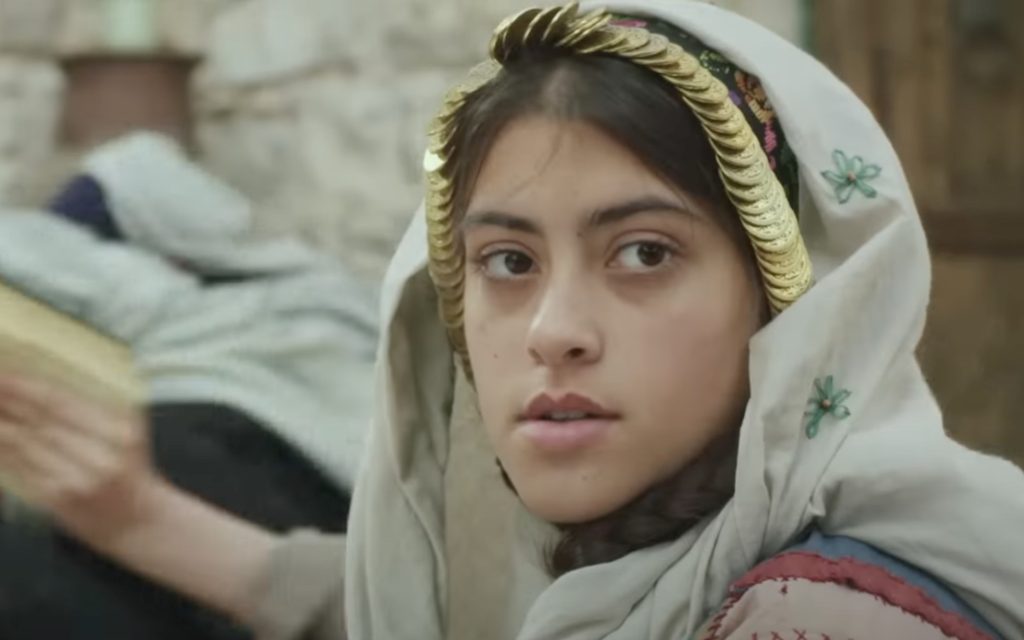Words spread and facts revealed
Jordanian Film Farha (Joy) produced by a young 35-year-old Jordanian of Palestinian descent writer/director Darin Sallam.
The film was initially released on 14 September 2021, at Toronto Film Festival, won several awards among the Jury award at Malmo Arab Film Festival (MAFF) Malmo, Sweden.
The film was premiered in Amman International Film Festival (AIFF) 20-27 July 2022, under the theme: “First Film, First Love” and is the only one in the region to focus on first-time directors in Film.
Darin Sallam from Jordan, had her feature film, Farha, screened on home soil at the festival, a film that was inspired by a true story.
Farha
The events take place on the year 1948 around the days of Nakba. A 14-year-old lives in a village in Palestine, had dreams to continue her education. As she gets closer to her dream, the looming danger reaches her village. Terrorized for his daughter’s safety, Farha’s father locks her up in storage room and goes to join the resistance. He promised her to return but never did.
In the narrow dark space, Farah’s only connection to the outside is a small keyhole and few cracks in the wooden door. While in hiding, she witnesses the Israeli Occupation Forces carry out the execution of an entire Palestinian family, among them is a woman who just gave birth to a baby, after the mother’s execution, the newborn baby was left on the ground by the soldiers and died thereafter.
The symbol in the film is the traditional Palestinian embroidered dress (thob), the headband fulfilled with silver coins worn by Farha. Yet the big iron key which was found by the soldier in the chest pocket of the woman’s dress, while searching her prior to her execution. The big iron house key, is a key found hanged in every Palestinian home as a promise to the return and to reopen their confiscated houses.
As stated by Sallam,
“The film is based on a true story of a friend of her mother’s, that she was told as a child about a Palestinian girl named Radiyeh who experienced the Nakba and the 1948 displacement of Palestinians from their homeland. In the film we are told the truth: its story stayed with me since I was a child; Farha means Joy, and Palestine was the joy that was stolen from the Palestinians”.
Story for all Generations
The film brought to mind the suffering of the Palestinian people and the history of their catastrophe. Therefore, its idea was reinforced among all segments of society in general, and among Palestinian and Arab youth in particular, its outcome: they bring it out on all their sites, in work corridors, and on social media.
In an article released by CNN (12 December 2022), Leila Giries an 82-year-old Palestinian refugee who survived the war. Sat in her California home, took a deep breath and pressed play on a film she says, forced her to relive the most traumatic moment of her life.
Liela said: “My kids were watching it, when they asked me what I thought I couldn’t answer them because of how hard I was crying. All I could say was: “Farha is me. That’s me in that room.”
That will take us back to Britain, Nada Afaneh, 22-years-old Palestinian living in exile, works as a teacher in a British school located in North London; based on Farha follow-up, Nada pressed on the school officials towards that the Israeli Palestinian cause that should focus more on the Palestinian’s side story. Her letter to the school was tweeted by her father Engineer Afaneh on 9 December 2022:
“Regarding your RE class, as they are studying the “conflict” between Israel and Palestine, I believe it’s the perfect time to show the class the movie Farha on Netflix as it is showcasing the truth about Palestine and how it was taken by Israel. Israel is trying very hard to take it off Netflix as they are afraid of the truth and I strongly believe that the truth should be taught. The class needs to be exposed to an alternative perspective.”
Nada indicated that there is a gap in the curriculum and the Palestinian side of the story is adequately represented. Nada received a reply to her remarkable note from the school administration mentioning that they are doing their best to ensure that the Palestinian perspective is fairly represented in the future and the matter will be brought up with the head of the RE to act and show the movie to the students.
Marwa Fatafta’s a Palestinian living in Saudi Arabia tweeted on 14 December stating:
“It’s refreshing to see a mainstream media outlet feature Palestinian voice and nakba survivor’s reflection! Farha is not a fictional story of this girl; it is my story and the Palestinian story.”
Tantura Out of Your Own Mouth I Will Judge You
The moment Netflix broadcast Farha on December 2022; Israel attacked its concept, as it strikes the reputation of the IDF showing soldiers, shooting all members of a Palestinian family.
Meanwhile, Israel is lobbying that the film should not run in Jordan’s 2023 Oscars award entry, pressing to withdraw its nomination: as it is “creating a false narrative” about Israeli soldiers. In fact, Tantura film provides facts as already confirmed by Israeli historians.
According to the World Socialist Web Site WSWS (6 December 2022): Tantura Documentary is about Israeli destruction of a Palestinian village in 1984, and its massacre that took place the night of 22-23 May 1948.
Tantura by Israeli filmmaker Alon Schwarz documents the massacre. His film, the product of more than two years of research, involves the use of original audiotape recordings, dramatic recreations and never seen archival materials from the 1948 showing Palestinians shot in Tantura.
Before it was erased from the map, Tantura had been a coastal village in Palestine. It is estimated that 270–280 Palestinians were murdered in the village.
The documentary chronicles the story through interviews with surviving veterans of the “Alexandroni Brigade, some remorseful, some not.
In an interview with “the Intercept” Schwarz forcefully remarks:
“We robbed the Palestinians of their history, ethnically cleansed them, took them out, denied their return, we robbed them of the true story.
One former soldier comments in Tantura that: “there were many Arab casualties, scattered like garbage”.
“It’s forbidden to tell” says another witness sheepishly.
Haim Levin relates how a member of his unit killed a group of 20 POWs.
Amitzur cohen confessed “I was a murderer; I had a machine gun with 250 bullets I didn’t count the Arabs that I killed.
Tantura is an ensemble work with lots of voices. But the main narrative is based on research by a Haifa University student Teddy Katabout, the effect of the 1948 war on five villages, including Tantura. He conducted 140 hours of audio interviews with 153 people, both Palestinians and Israeli witnesses and participants in the events of Tantura.
His conclusion is that there was a massacre of 200-250 Palestinians, launched by IDF’s Alexandroni Brigade. Casualties were buried in mass graves.
Zionist soldier, while laughing, said to channel Hot 8:
We put Palestinians in cages and killed them. One of us raped a 16-year-old-gir.
The End Result
Palestinians over the Globe made their children/grandchildren a must to watch Farha, as it reassures the collective memory of a nation. The Nakba, since it is an influential reflection of an out-suffering experience that conveys the truth about displaced refugees. Farha story is every Palestinian recital.





